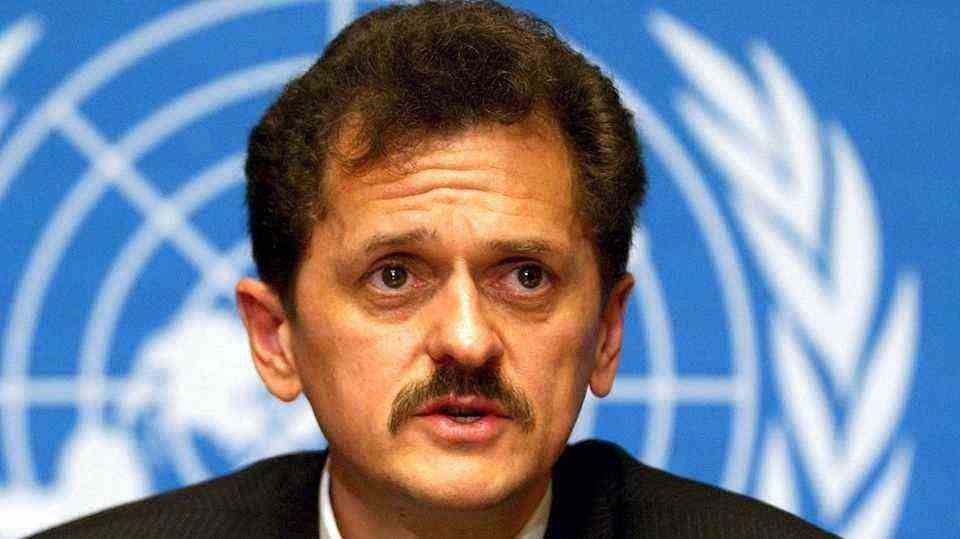Minister of Health
Lauterbach advocates compulsory vaccination from April or May and expects the omicron wave to peak in mid-February
When is Omicron over? Federal Health Minister Karl Lauterbach (SPD) expects the wave to peak in mid-February.
© Kay Nietfeld / DPA
Omicron is not over yet. Federal Health Minister Karl Lauterbach made that clear. He expects the peak in a few weeks. In order to protect unvaccinated people from a possible corona wave in autumn, the SPD politician is calling for vaccination to be compulsory from April or May.
Federal Health Minister Karl Lauterbach considers it important that a possible corona vaccination obligation comes into force quickly after a corresponding decision by the Bundestag. The obligation to vaccinate must come quickly, said the SPD politician on Tuesday evening on the “RTL Direkt” program. “If we want to make an application that still works, then it is an application that puts vaccinations into effect – I don’t know – in April or around April, maybe in May.” As a reason, he stated that there was still enough time to immunize unvaccinated people before a possible new corona wave in autumn.
Anyone who has not yet been vaccinated must “go through three vaccination cycles (…) and by then it will be in September or October,” said Lauterbach. “Because that has to happen quickly so that I can stop the wave – and that’s the reason for the obligation to vaccinate – so that I can still avert the wave in the fall.”
Lauterbach: Seven-day incidence significantly higher than reported
Lauterbach and Chancellor Olaf Scholz (SPD) advocate general vaccination. However, there should be no government proposal from the red-green-yellow coalition. Instead, groups of MPs should bring motions to Parliament on the subject. The Union had criticized this approach.
The Federal Minister of Health also expects that the omicron wave will only reach its peak in a few weeks. “I think we will reach the peak of the wave in mid-February, and then the number of cases could fall again, but we have not yet reached the peak,” said Lauterbach on RTL.
Lauterbach also assumes that the nationwide seven-day incidence is significantly higher than the value of 553.2 reported on Tuesday. The number of unreported cases should be “roughly a factor of two,” Lauterbach estimated. “We don’t know exactly whether there are a thousand.” But he expects even higher numbers of cases.
Lauterbach warns of possible other corona variants
Lauterbach shares the opinion of experts such as the Berlin virologist Christian Drosten that at some point everyone will become infected. However, that does not mean that vaccination is unnecessary. “There is still no basic immunity, especially for the elderly and sick,” warned the minister, who therefore called for a quick decision by the Bundestag to introduce compulsory vaccination.
Lauterbach also warned that more new variants of the corona virus could emerge by the fall. “Then we would be left empty-handed when we again have the large number of unvaccinated people that we have to protect to prevent the health system from being overloaded.”
The Greens health expert Janosch Dahmen told the editorial network Germany (RND, Wednesday): “I believe that the German Bundestag should vote on the general obligation to vaccinate against the corona virus in March after thorough consultation.” If you want to keep to this time frame, “it would make sense to discuss the group applications for the first time in February”. Lauterbach said with a view to the upcoming deliberations in parliament: “I would say that we will see important debates there at the end of February/beginning of March.”

Different views on compulsory vaccination at traffic lights
The SPD parliamentary group had already mentioned the goal of finalizing the decision in March. Next week, Wednesday, there will be a first orientation debate in the Bundestag. SPD faction deputy Dirk Wiese told the RND that he expected further specific group applications afterwards. The traffic light alliance is aiming for a vote without the usual group discipline and justifies this by saying that it is an ethical question. There are also different views on the subject within the coalition – some FDP politicians expressed sympathy for compulsory vaccination only for older people, while other FDP MPs around party vice-president Wolfgang Kubicki completely reject compulsory vaccination.


